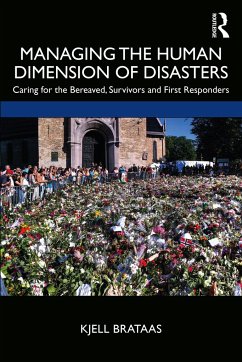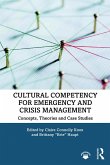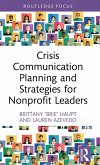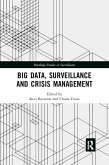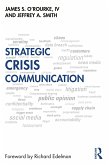Managing the Human Dimension of Disasters provides the most comprehensive and up-to-date analysis on how individuals cope with tragedy and loss.
Kjell Brataas gives a voice to those who have suffered and have been affected by unimaginable trauma. Noted experts recount stories and share their knowledge of how they assisted victims following tragedies such as the Manchester Arena bombing, the 2004 Indian Ocean tsunami, terror attacks, several aircraft disasters and school shootings, the 9/11 attacks and the COVID-19 pandemic. The book focuses on those affected by a disaster, including the bereaved, survivors and first responders. Leaders of support groups formed after these tragedies, trauma therapists and psychologists from three continents offer their experiences dealing with victims and the aftermath of disaster. Chapters provide guidance on memorializing tragedies, site visits, donation management, media relations, social media, grief counseling and human resilience.Readers will be shown that psychological support is critical after a disaster and learn from those who deal with emergencies.
Brataas' unmatched volume offers new understandings, recommendations, best practices and benchmarks on how best to assist victims in the aftermath of disaster. A valuable resource for students, researchers and practitioners.
Kjell Brataas gives a voice to those who have suffered and have been affected by unimaginable trauma. Noted experts recount stories and share their knowledge of how they assisted victims following tragedies such as the Manchester Arena bombing, the 2004 Indian Ocean tsunami, terror attacks, several aircraft disasters and school shootings, the 9/11 attacks and the COVID-19 pandemic. The book focuses on those affected by a disaster, including the bereaved, survivors and first responders. Leaders of support groups formed after these tragedies, trauma therapists and psychologists from three continents offer their experiences dealing with victims and the aftermath of disaster. Chapters provide guidance on memorializing tragedies, site visits, donation management, media relations, social media, grief counseling and human resilience.Readers will be shown that psychological support is critical after a disaster and learn from those who deal with emergencies.
Brataas' unmatched volume offers new understandings, recommendations, best practices and benchmarks on how best to assist victims in the aftermath of disaster. A valuable resource for students, researchers and practitioners.
"This book doesn't just provide a hands-on guide on how to respond to collective tragedy with care and compassion. Nor does it just offer readers a detailed understanding of the universal and complex human impacts of disaster. It highlights the fundamental connection between the two and the value of a truly humanitarian approach. A must read for anyone wishing to make a positive difference."
Anne Eyre, Specialist in psychosocial aspects of major incidents, emergency planning and disaster management and Vice-Chair of Disaster Action
"Following up his incredibly instructive book on Crisis Communication, Kjell Brataas provides essential advice on handling the emotional and psychological needs of survivors, as well as first responders, as they deal with an event, from right after on to years later. With insightful interviews, critical information about topics such as PTSD, school shootings, and planning, this valuable book also has a timely section on learning from the current COVID pandemic. Everyone who deals with disasters and crisis should own this book."
Bob Jensen, Senior Managing Director, Strat3 and former Principal Deputy Assistant Secretary, U.S. Department of Homeland Security
"The UN Office for Disaster Risk Reduction (UNDRR) has recently declared top stop using the term Natural Disaster preferring to simply use Disaster arguing that Disasters only happen when they impact a community. Following that thought then surely the biggest impact is the emotional impact. This book is an important and timely exploration of the emotional effects on those impacted by disasters. Kjell writes with deep compassion and has woven many varying case studies to enweave the complexity of dealing with the human factors of disaster."
Peter Rekers, Crisis, Risk Emergency and Disaster Communications Practitioner and Educator
"I cannot imagine a more timely book written by an extremely knowledgeable expert in the field. How disasters affect people is not only relevant during Covid-19, it is also an important topic during natural disasters, school shootings and terror attacks. Kjell Brataas has years of experience writing about the topic, and he also played a key role in assisting the Norwegian government during the terror attacks in Norway in 2011. This wealth of knowledge is clearly demonstrated in a well written book that provides the reader with important insights into an under-researched area in Crisis Management, the human dimensions of disasters."
Daniel Laufer, Associate Professor of Marketing, Victoria University of Wellington
"Kjell Brataas clearly shows in this book that you can only do the right thing in the aftermath of disasters if you start your preparations well in advance. And make use of the experiences of victims (better: survivors) and first responders involved in other disasters. This book is an essential resource for everybody who has to draft or update planning for disasters. Events that nobody wants to happen but will happen anyway, without a doubt."
Victor Jammers, Director of Operations of the EU Centre of Expertise for Victims of Terrorism
"Of all of the complexities involved in managing the consequences of disasters, none are as difficult as the emotional and behavioral impacts on victims, survivors, and responders to such events. Missing from many discussions of disaster management is the importance of the phase-specific and hazard-specific nature of our reactions to traumas and tragedies. Brataas has created an important and timely guide for planners and responders addressing the human toll of disasters."
Steven Crimando, Principal and Founder, Behavioral Science Applications LLC
"The book does much more than just document many of the humanitarian disasters and emergencies from recent years. It gives a thought provoking insight into the impact of crises on people including the bereaved, survivors and the first responders. For anyone involved in emergency response, crisis management and communication it is essential reading that will question current practice and plans."
Amanda Coleman, Crisis Communication Consultant and fellow of The Chartered Institute of Public Relations and The Public Relations and Communications Association (PRCA)
Anne Eyre, Specialist in psychosocial aspects of major incidents, emergency planning and disaster management and Vice-Chair of Disaster Action
"Following up his incredibly instructive book on Crisis Communication, Kjell Brataas provides essential advice on handling the emotional and psychological needs of survivors, as well as first responders, as they deal with an event, from right after on to years later. With insightful interviews, critical information about topics such as PTSD, school shootings, and planning, this valuable book also has a timely section on learning from the current COVID pandemic. Everyone who deals with disasters and crisis should own this book."
Bob Jensen, Senior Managing Director, Strat3 and former Principal Deputy Assistant Secretary, U.S. Department of Homeland Security
"The UN Office for Disaster Risk Reduction (UNDRR) has recently declared top stop using the term Natural Disaster preferring to simply use Disaster arguing that Disasters only happen when they impact a community. Following that thought then surely the biggest impact is the emotional impact. This book is an important and timely exploration of the emotional effects on those impacted by disasters. Kjell writes with deep compassion and has woven many varying case studies to enweave the complexity of dealing with the human factors of disaster."
Peter Rekers, Crisis, Risk Emergency and Disaster Communications Practitioner and Educator
"I cannot imagine a more timely book written by an extremely knowledgeable expert in the field. How disasters affect people is not only relevant during Covid-19, it is also an important topic during natural disasters, school shootings and terror attacks. Kjell Brataas has years of experience writing about the topic, and he also played a key role in assisting the Norwegian government during the terror attacks in Norway in 2011. This wealth of knowledge is clearly demonstrated in a well written book that provides the reader with important insights into an under-researched area in Crisis Management, the human dimensions of disasters."
Daniel Laufer, Associate Professor of Marketing, Victoria University of Wellington
"Kjell Brataas clearly shows in this book that you can only do the right thing in the aftermath of disasters if you start your preparations well in advance. And make use of the experiences of victims (better: survivors) and first responders involved in other disasters. This book is an essential resource for everybody who has to draft or update planning for disasters. Events that nobody wants to happen but will happen anyway, without a doubt."
Victor Jammers, Director of Operations of the EU Centre of Expertise for Victims of Terrorism
"Of all of the complexities involved in managing the consequences of disasters, none are as difficult as the emotional and behavioral impacts on victims, survivors, and responders to such events. Missing from many discussions of disaster management is the importance of the phase-specific and hazard-specific nature of our reactions to traumas and tragedies. Brataas has created an important and timely guide for planners and responders addressing the human toll of disasters."
Steven Crimando, Principal and Founder, Behavioral Science Applications LLC
"The book does much more than just document many of the humanitarian disasters and emergencies from recent years. It gives a thought provoking insight into the impact of crises on people including the bereaved, survivors and the first responders. For anyone involved in emergency response, crisis management and communication it is essential reading that will question current practice and plans."
Amanda Coleman, Crisis Communication Consultant and fellow of The Chartered Institute of Public Relations and The Public Relations and Communications Association (PRCA)

